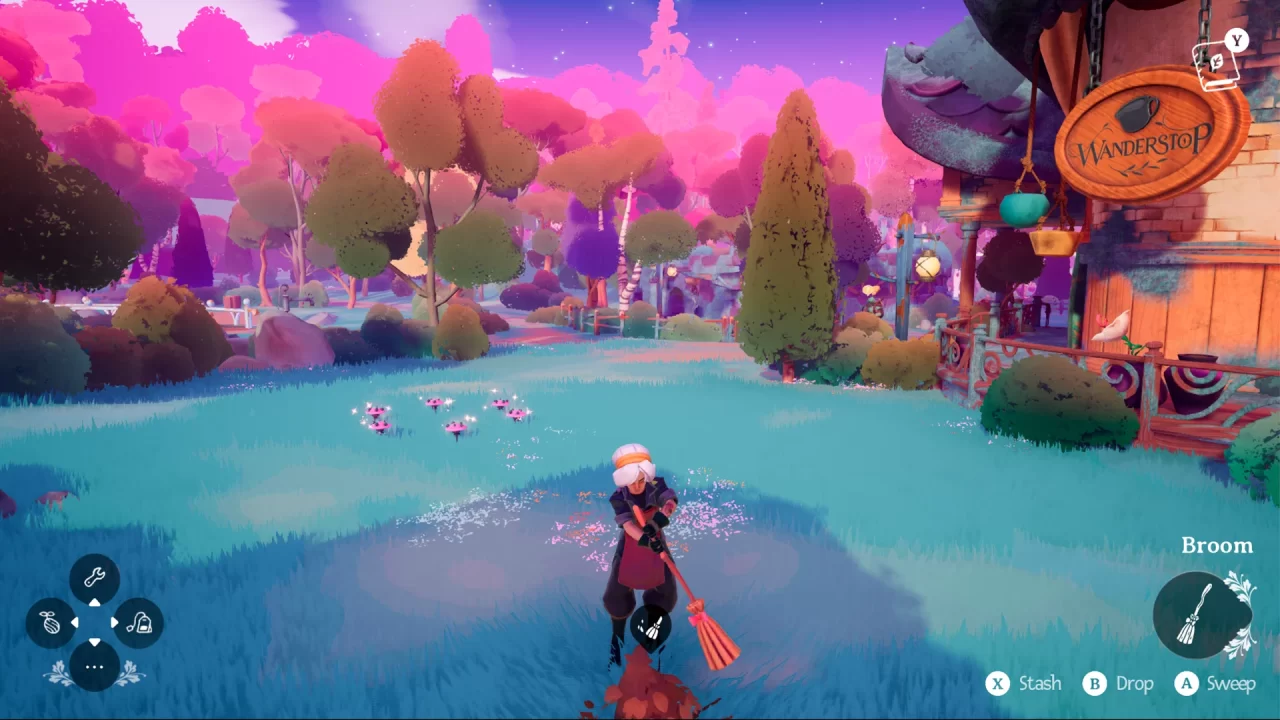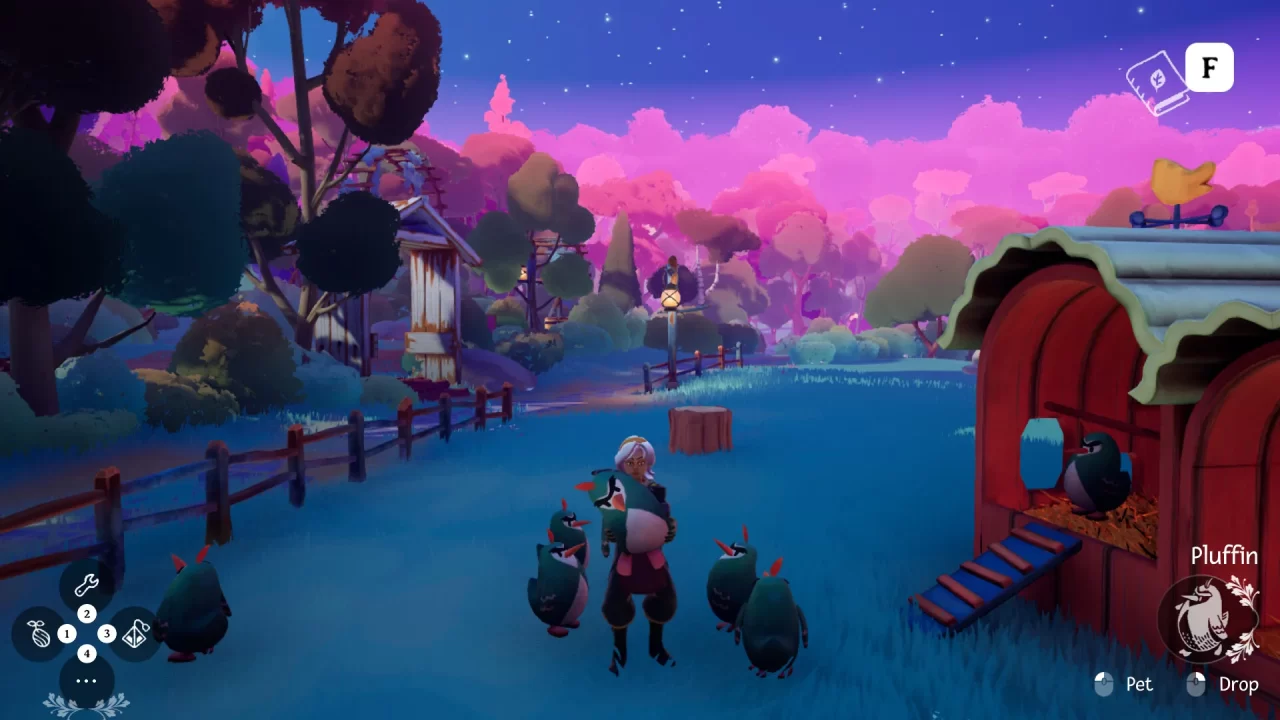After being somewhat absent from the limelight for several years since making waves in the early- to mid-2010s, the indie dream team of Davey Wreden (The Stanley Parable, The Beginner’s Guide), Karla Zimonja (Gone Home, Tacoma), and C418 (Minecraft) have joined forces under the banner of Ivy Road to bring us Wanderstop: a cozy game for people who don’t like cozy games.
For Wreden especially, who cut his teeth in the industry crafting subversive, metatextual narrative games that challenged the nature of video games as a medium for storytelling, Wanderstop stands out as his most conventional game yet. That’s by no means a bad thing, however. On the contrary, this may be my favorite project of his.
No doubt that’s why Karla Zimonja got drafted into this particular endeavor with him. Zimonja is perhaps best known for co-founding Fullbright with fellow creatives from 2K Marin, who helped create the critically acclaimed Bioshock 2 DLC, Minerva’s Den. Together, they were responsible for Gone Home and Tacoma, narrative adventure games that went on to win critical acclaim and numerous awards, praised in particular for their strong storytelling and grasp of characters.
Lastly, every good cozy game needs an equally cozy, memorable soundtrack, and who better than Daniel Rosenfeld (aka C418), the masterful maestro behind Minecraft‘s music, to round out Ivy Road’s founding trio and lend his ear for beautiful, ethereal music to this project. Rosenfeld has been out of the composing game for a while, it seems, with his last project being the Steam release of Cookie Clicker in 2021. Not to worry, however, as I can confidently confirm that he has not lost his touch even one bit with Wanderstop’s soundtrack.
Wanderstop truly is a cozy game for people who don’t like cozy games, and I would certainly count myself among that group. Not for lack of trying, of course. I can absolutely see the appeal in them. I’ve never been overly fond of video games with no overt end goal to them, like your Animal Crossings or Harvest Moons, or even Stardew Valley. Sure, you may say the end goal is to build up your farm, but the question then becomes, “When will I know that I’m done?”
And yet, the brilliant thing about Wanderstop is that its protagonist, Alta, is in the exact same position as cozy-skeptical players. She was an undefeated arena fighter for many years. Effortlessly skilled, brutal, and calculating, she trained hard, fought harder, and never lost a fight in her seven-year-long crusade. And then, one day, she lost. Then she kept losing. So now, she must venture deep into the forests to find the legendary Master Winters and train with her. But wait, suddenly she can’t even pick up her sword? And what’s with this sudden fatigue?
Having collapsed a short way into the forest, Alta finds herself rescued by Boro, a large, affable, kind, and humble man who runs Wanderstop, a tea shop in the middle of the forest. Out of the kindness of his heart, Boro rescued her, asking for nothing in return except to politely request that she rest and recuperate at Wanderstop before continuing on her journey.
So she does. Except, she can’t? Whenever she tries to venture through the forest, she finds herself quickly fatigued and collapsing yet again, with Boro coming to her rescue shortly after. Now, she’s stuck, seemingly cursed to help Boro brew tea in the middle of the forest for as long as it takes for her to regain her strength and ability to lift her sword once again.

What follows over the next 10-15 hours is a tale that’s deeply heartfelt and genuine, poignant and emotional, and at times genuinely funny to the point where I laughed out loud several times, which is not often something a game can make me do. These powerful, emotional moments are never trivial or exploitative and are always in service of Alta’s development as a troubled protagonist with a complicated past. The game deftly deals with themes such as burnout, defining your place in the world, difficulty with the notion of settling down, self-sabotage, and the endless pursuit of bigger ambitions. Don’t be put off by how cutesy and gentle Wanderstop may look, either. The game is no slouch when it comes to addressing these topics and issues with the severity and care that they require without ever compromising on depicting them with brutal honesty.
The lead relationship between Alta and Boro is far and away the highlight of the game. Alta is brash, abrasive, impulsive, and relentless in her endeavors, which is offset by Boro’s warm, sweet, gentle, and sincere nature, so the two play off of each other brilliantly. While Alta is initially suspicious of Boro’s selflessness, she eventually warms to him (in her own way) and he soon becomes her north star to ground her in the present while she frequently spirals into the mistakes of her past. The dynamic that evolves between them throughout the game’s narrative is wonderful to witness and is the game’s emotional core.
When it comes to gathering ingredients and brewing tea, which is a good 80% of what you’ll be doing in Wanderstop, I’m happy to report that it is indeed relaxing and fun in ways that I was not anticipating. As I’ve said, I’m not usually one for cozy games or management sims, but even for the uninitiated or uninterested, Wanderstop does just enough to keep you engaged throughout its 15-hour playtime. Whether through the story development, talking with the shop’s rotating cast of wacky, eccentric customers, or figuring out how you’ll fulfill their orders, the game continually ensures that there’s always a carrot on a stick for you to chase.
The process of brewing tea is a multistep endeavor that involves finding and planting seeds in certain configurations, either to make more seeds or to grow ‘large hybrids’: plants that sprout certain fruits that you can throw into the mixing pot for different flavors. Then, you gather tea leaves around the clearing that you put into bowls so they dry and become tea balls. After, you go to the main tea brewing contraption, fill the large flask with water, heat it in the bellows, funnel it through valves, throw your ingredients in, and pour the finished brew into a cup to serve.
If that sounds overwhelming and time-consuming, worry not. There’s a handy guide for both the gardening and tea brewing aspects of the process that you can refer to at any time. If you’re further stuck, there’s also a big book of answers to every order that gives more detailed steps on making certain ingredients that you can also reference any time with no penalties. While it may seem tedious at first, the entire step-by-step process soon becomes second nature, and you’ll be a bonafide tea-brewing master by the game’s end.
That said, there are still some issues with the experience. While Wanderstop is very good at placing lulls and story intervals at particular points when the main gameplay loop of gardening and brewing may be wearing thin, there are certain parts, particularly when the story truly ramps up in the game’s third act, where you want to focus on the narrative and not care as much for making tea. Then again, that may be more on me than Wanderstop itself, since it does a great job of throwing new ingredients at you to create specific blends with some truly bizarre, outside-the-box requests from certain customers.

When it comes to gardening, the placement of plants and seeds can sometimes be imprecise, particularly when you have only so many in your pouch and their specific placement matters. There’s no way to undo your actions, so you’re otherwise forced to go scrounge for more or start from scratch, which can be tedious and time-consuming. This also extends to brewing since you have to do the entire process manually, and it’s easy to accidentally miss a crucial step when you’re going through several orders in a row.
Honestly, if there were some way to have HUD-based reminders on occasion, or even to automate this process somewhat without it going against the core thesis of the game, that could make the process easier.
Lastly, there is quality voice acting in Wanderstop, but you barely hear it throughout the game, which could no doubt frustrate some. In fairness, it’s employed well and in appropriate places, usually to denote a character’s inner voice. However, the vast majority of the characters (including co-lead Boro) remain voiceless, which is a bit of a shame. But again, this is a matter of individual player preference and may work for some more than others.
All told, I loved Wanderstop in a way that I honestly wasn’t anticipating. I mean, I was sure I’d enjoy the story, music, and writing given the pedigree of Ivy Road’s founders. Yet, I was taken aback by how much I, a management sim skeptic, enjoyed the gardening and tea-brewing gameplay loop. Good thing too, since it’s most of what Wanderstop offers. Well, that and the aforementioned fantastic story, characters, and mature writing that is at times as genuinely laugh-out-loud funny as it is emotionally rich. Let’s also not fail to mention yet another wonderful, moving soundtrack by master composer C418.
A few blemishes could be buffed out, but the blend that Ivy Road has brewed for us here is well worth savoring.





